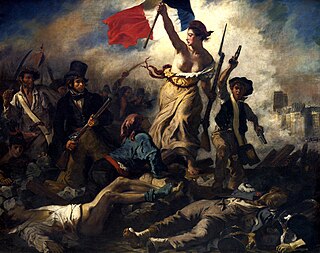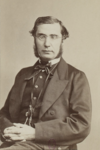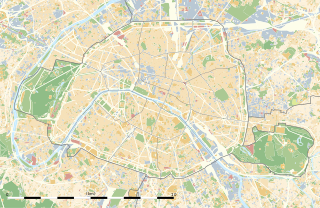
Napoleon III was the first elected President of France from 1848 to 1852. When he could not constitutionally be re-elected, he seized power in 1851 and became the Emperor of the French from 1852 to 1870. He founded the Second French Empire and was its only emperor until the defeat of the French army and his capture by Prussia and its allies in the Franco-Prussian War in 1870. He worked to modernize the French economy, rebuilt the center of Paris, expanded the overseas empire, and engaged in the Crimean War and the war for Italian unification. After his defeat and downfall he went into exile and died in England in 1873.

Napoléon, Prince Imperial, also known as Louis-Napoléon Bonaparte, was the only child of Emperor Napoleon III and his Empress consort, Eugénie de Montijo. After his father was dethroned in 1870, he relocated with his family to England. On his father's death in January 1873, he was proclaimed by the Bonapartist faction as Napoleon IV, Emperor of the French.

DoñaMaría Eugenia Ignacia Augustina de Palafox y KirkPatrick, 16th Countess of Teba, 15th Marchioness of Ardales, known as Eugénie de Montijo, was the last Empress Consort of the French (1853–70) as the wife of Napoleon III, Emperor of the French.
Pierre Marie Augustin Filon (1841–1916) Professor of rhetoric and the author of a number of works of fiction, as well many articles, reviews and books on contemporary English politics, art and literature.

The volatile period of civil unrest in France during May 1968 was punctuated by demonstrations and major general strikes as well as the occupation of universities and factories across France. At its height, it brought the economy of France almost to a halt. The protests reached such a point that political leaders feared civil war or revolution; the national government itself briefly ceased to function after President Charles de Gaulle secretly fled France for a few hours. The protests spurred an artistic movement, with songs, imaginative graffiti, posters, and slogans.

The French Revolution of 1830, also known as the July Revolution, Second French Revolution or Trois Glorieuses in French, led to the overthrow of King Charles X, the French Bourbon monarch, and the ascent of his cousin Louis Philippe, Duke of Orléans, who himself, after 18 precarious years on the throne, would be overthrown in 1848. It marked the shift from one constitutional monarchy, under the restored House of Bourbon, to another, the July Monarchy; the transition of power from the House of Bourbon to its cadet branch, the House of Orléans; and the replacement of the principle of hereditary right by popular sovereignty. Supporters of the Bourbon would be called Legitimists, and supporters of Louis Philippe Orléanists.

The Tuileries Palace was a royal and imperial palace in Paris which stood on the right bank of the River Seine. It was the usual Parisian residence of most French monarchs, from Henry IV to Napoleon III, until it was burned by the Paris Commune in 1871.

Alexandre François Marie, Viscount of Beauharnais was a French political figure and general during the French Revolution. He was the first husband of Joséphine Tascher de la Pagerie, who later married Napoleon Bonaparte and became Empress of the First Empire.
The Baltimore riot of 1968 was a period of civil unrest that lasted from April 6 to April 14, 1968 in Baltimore. The uprising included crowds filling the streets, burning and looting local businesses, and confronting the police and national guard.
The Bristol riots refer to a number of significant riots in the city of Bristol in England.

The Église Saint-Augustin de Paris is a Catholic church located at 46 boulevard Malesherbes in the 8th arrondissement of Paris. The church was designed to provide a prominent vista at the end of the boulevard both of which were built during Haussmann's renovation of Paris under the Second French Empire. The closest métro station is Saint-Augustin

A series of mass protests were held in Armenia in the wake of the Armenian presidential election of 19 February 2008. Mass protests against alleged electoral fraud were held in the capital city of Yerevan and organised by supporters of the unsuccessful presidential candidate and first President of the Republic of Armenia, Levon Ter-Petrosyan.

Princess Marie Amelie of Baden was the youngest daughter of Charles, Grand Duke of Baden and Stéphanie de Beauharnais,. In 1843, she married the Scottish nobleman William Hamilton, Marquess of Douglas and Clydesdale. They became the Duke and Duchess of Hamilton upon the death of William's father in 1852. Their only daughter Mary married the future Albert I, Prince of Monaco and was the mother of Louis II.
In 1981, England suffered serious riots across many major cities. They were perceived as race riots between communities, in all cases the main motives for the riots were related to racial tension and inner city deprivation. The riots were caused by a distrust of the police and authority. The four most serious riots that occurred were the Brixton riot in London, the Handsworth riots in Birmingham, the Chapeltown riot in Leeds and the Toxteth riots in Liverpool. There were also a series of less serious riots in other towns and cities.

The Jordanian protests were a series of protests in Jordan that began in January 2011, and resulted in the firing of the cabinet ministers of the government. In its early phase, protests in Jordan were initially against unemployment, inflation, corruption. along with demanding for real constitutional monarchy and electoral reforms.

Émile Waldteufel was a French pianist, conductor and composer of dance and concert music.

A Eugénie hat is a small women's hat that is usually worn tilted forwards over the face, or it may be angled low over one eye. Typically, it is made of velvet or felt, although a variety of materials may be used. The classic design also has a plume of feathers, although other trims may be used.

Élisa Garnerin (1791-1853) was a French balloonist and parachutist. She was the niece of the pioneer parachutist André-Jacques Garnerin, and took advantage of his name and of the novelty of a woman performing what were at the time extremely daring feats. She was a determined businesswoman, and at times got into trouble with the police for the disturbance her performances caused, failure to pay all taxes due and failure to deliver all that her advertising had promised. She toured the provinces of France, Spain, Italy, and other parts of Europe, making 39 descents in all between 1815 and 1835.

Émile Joseph Marie Piétri, known as Joachim Pietri, was a French lawyer and public servant who was prefect of several departments, a repressive police chief of Paris in the last years of the Second French Empire and Bonapartist Senator of Corsica from 1879 to 1885.




























